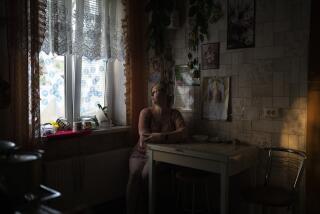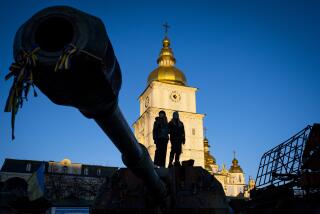Muslims in Strategic Strip of Bosnia Stake Their Claim : Balkans: Posavina Corridor villagers want to take back key city from rebel Serbs. U.S. troops are due soon.
- Share via
BRKA, Bosnia-Herzegovina — Here on Bosnia’s cease-fire line, the anxious villagers think of only one thing: reuniting their war-torn region with the city of Brcko, 2 1/2 miles to the north.
The Bosnian army’s front line runs across the northern edge of the village, and rebel Serb units are not far beyond. Even with the recent peace agreement, the sound of gunfire is not unusual around Brka, where Bosnian Muslim soldiers say they are ready to fight again.
“If Brcko is not given to us, we will take it by force,” said Itko Cardaklija, a 33-year-old Muslim soldier and Brcko native whose wife fled the fighting for New Jersey. “It is a common opinion here. We have to take back our city.”
For the 20,000 U.S. soldiers mobilizing in northeastern Bosnia-Herzegovina, this hotly contested region known as the Posavina Corridor is the likely flash point for future conflict between the rival factions.
Brka (pronounced Birka), the scene of fierce house-to-house combat in 1993, sits on the edge of the corridor--a strategic territory so disputed that the Dayton, Ohio, peace negotiators could not forge an agreement as to which side should control it.
The fate of Brcko (pronounced Birchko) and the Posavina Corridor will be decided in the next year by international arbitration.
For the rebel Serbs, Posavina is a critical east-west corridor connecting the two halves of the territory that their army seized from the Bosnian government.
For the Bosnian Muslims, the region is a crucial link to the north. Brcko, they say, is an essential port city--Bosnia’s “door” to northern Europe.
“Without the corridor, all of Bosnia will be an island,” said Eldina Pamukcic, who was born in Brcko but now lives in Brka, where she owns a restaurant with her husband. “Brcko must be ours. The Americans must help us.”
Within weeks, the Americans will be arriving in great force in the Posavina Corridor.
Already, U.S. peacekeeping troops are gathering on the north side of the Sava River, the border between Croatia and Serb-held territory.
In a small feat of engineering, they expect to build a pontoon bridge across the river next week, then begin pouring through the Posavina Corridor.
U.S. plans call for deployment of troops in the corridor in January. Already, U.S. officers and troops have begun conducting reconnaissance missions in the area from the air base in Tuzla, about 90 minutes to the south.
The ravages of war are evident in the village of Brka. Logs cover up the holes in houses shelled by the Serbs from miles away. Big Xs are taped on the windows of other homes to keep bombs from shattering the glass.
Dozens of men, most of them wearing camouflage uniforms, stand on the streets, talking and smoking. One man sells fuel in Pepsi bottles lined up on the sidewalk. At the main crossroads in town, directional signs have been painted on a building in large letters: One arrow points to the city of Tuzla, the other to the “Ratna Zona”--the war zone.
In the cemetery next to the village mosque are more than 75 new graves with simple wooden markers. Most of the dead were soldiers killed since the fighting began in 1992. On several markers, the paint used to write their names has already washed away.
Edin, a 19-year-old special forces soldier who declines to give his last name, walks among the graves remembering his friends. Here are the two soldiers who destroyed 15 Serb tanks in a day; songs were written about their feat. Here is his best friend, killed by a sniper.
But Edin, like others in town, is not ready for the war to end. He proudly carries in his pocket the Serbian money he took from the body of a Serb soldier he killed.
“It’s hard to believe in peace with them,” he said, standing among the graves. “I only want to fight them. . . . We want to take back our territory, our towns, our villages, and after that we will have peace.”
On the muddy streets of Brka, the wounds of war are evident as well. Here is a soldier who lost half his foot to a land mine. Here is another who walks with crutches, his leg shot by a sniper. Here is one who cannot quite recall how he was hurt, except that a bomb wounded him in the head.
And here is Hasija Saletovic, a 67-year-old woman with few teeth in her mouth and a scarf on her head, who breaks down in tears in the middle of the road when she thinks about her soldier son, beaten to death by Serbs in 1992.
Will there be peace? “It depends on God and the Americans,” she says.
When the heavy fighting occurred in Brka two years ago, about 20 villagers hid in Eldina Pamukcic’s Cafe King and watched as Serb shells fired from five miles away landed on nearby houses and killed their neighbors.
Pamukcic stayed behind to feed the soldiers and her friends--and to destroy her home and restaurant if the Serbs took the village. “I decided if I must go, I will burn everything,” she said.
Growing up in Brcko, her best friend was a Serb, who recently tried to contact her through the Red Cross. But Pamukcic would not talk. “We lived all together in peace, and suddenly they didn’t want us,” she says bitterly.
When she discusses the Serbs, her eyes narrow and her lips tighten. She sees little chance that the Muslims and Serbs can share Brcko and the Posavina Corridor now as they did before the war. There have been too many people killed, too many rapes by Serb soldiers. If there is to be a lasting peace, she says, the Bosnian Muslims must regain control of Brcko and all Serb war criminals must be sent to The Hague for trial.
“I don’t want to live with them anymore,” she said. “Everybody in the world must know we must have Brcko.”
More to Read
Sign up for Essential California
The most important California stories and recommendations in your inbox every morning.
You may occasionally receive promotional content from the Los Angeles Times.













